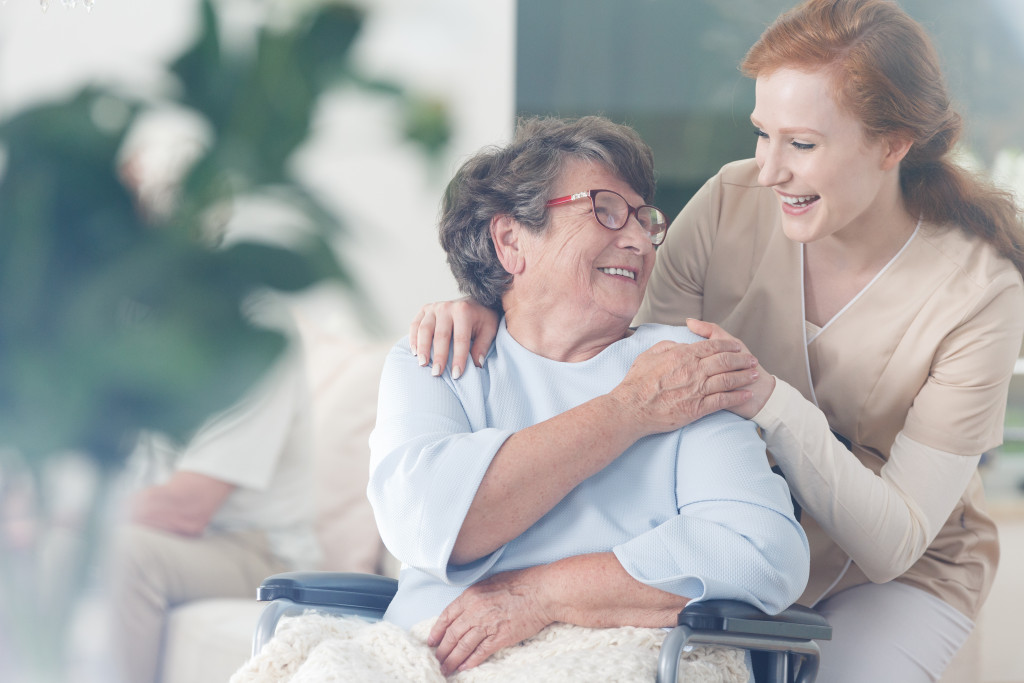- Create a support system, and enlist the help of family members and healthcare professionals.
- Seek professional help if feeling overwhelmed or needing assistance with administering medications or performing medical procedures.
- Make necessary modifications to the home environment, such as installing handrails or grab bars.
- Discuss diet with the doctor and make meal preparation easier by stocking on easy-to-prepare foods.
As your parents age, ensuring they are comfortable and well-cared for becomes increasingly essential. When a parent falls ill or develops a chronic condition, the responsibility of care can fall on their adult children. This can be incredibly challenging when the parent requires regular medical attention or home hospice care. This article will discuss tips on providing a comfortable life at home for your sick senior parents.
Create a Support System
The first step in providing care for your sick senior parent is to create a support system. This may include family members, friends, neighbors, and healthcare professionals. By enlisting the help of others, you will be able to share the caregiving responsibilities and ensure that your parent’s needs are being met.
Seek Professional Help
Caring for a sick senior parent can be emotionally draining and physically exhausting. Don’t hesitate to seek professional help if you’re feeling overwhelmed or need assistance with tasks such as administering medications or performing medical procedures.
Home hospice care is an option that many families choose when caring for a loved one who is terminally ill. Hospice providers offer skilled nursing care and emotional support for patients and their families.
Make Necessary Modifications to Your Home

When caring for a sick senior parent, it’s important to modify the home environment. This may include installing handrails or grab bars in bathrooms and hallways, ensuring no tripping hazards such as loose rugs or electrical cords, and ensuring all essential items are within easy reach.
If your parent requires specialized equipment such as hospital beds or oxygen tanks, work with your healthcare provider to determine what modifications need to be made to accommodate these items.
Ensure Proper Nutrition and Hydration
Caring for elderly parents can be a challenging but rewarding experience. One of the most important aspects of care for senior parents is ensuring they eat a healthy and nutritious diet. Unfortunately, seniors often don’t get the nutrition they need due to reduced appetite, difficulty preparing meals, and medication side effects. Here are three tips:
Discuss Their Diet With Their Doctor
The first step in ensuring your senior parent gets proper nutrition is to discuss their diet with their doctor or healthcare provider. Ask questions about what types of food they should be consuming and if there are any dietary restrictions that you should know about. This is especially important if your parent has been diagnosed with any health conditions such as diabetes or heart disease.
Make Meal Preparation Easier
Meal preparation can become more difficult as we age due to physical limitations or cognitive decline. To simplify things, stock up on easy-to-prepare foods like pre-washed fruits and vegetables, canned soups, frozen meals, and ready-made sandwiches or wraps from the grocery store deli section.
Consider Home Delivered Meals
For those who find it difficult to shop or cook for themselves, home-delivered meals can be an excellent solution for getting proper nutrition without worrying about meal planning or grocery shopping. Home delivery services also offer convenience and may help seniors stay connected with their communities by providing social interaction when someone delivers the meal each day.
Manage Medications Carefully
When caring for a sick senior parent at home, managing medications carefully is important. Keep track of dosages and schedules by creating a medication chart or using pill organizers. Be sure to communicate any changes in medication regimens with your healthcare provider so that they can monitor any potential side effects or interactions.
It’s also important not to mix medications without consulting with your healthcare provider first. Certain combinations of medications can have dangerous effects on seniors’ health.
Encourage Social Interaction

Social interaction is an essential aspect of maintaining good mental health in seniors. Encourage your sick senior parent to participate in social activities whenever possible – whether that means spending time with family members over dinner or attending community events together.
If mobility issues prevent them from leaving the house frequently, consider arranging visits from friends and family members regularly so they don’t feel isolated.
The Benefits of Social Interaction
You’re probably wondering why social interaction is so important for older adults. Studies have shown that social activities help to reduce stress, improve concentration, and boost overall mental health. They also provide an opportunity to stay connected with the outside world, which can be comforting for those who are ill or homebound.
Final Thoughts
Providing comfortable life at home for our aging parents requires careful planning & coordination. If they require specialized care, enlist the help of family, friends, and healthcare professionals. Make necessary modifications to your home to accommodate any special equipment that may be needed. Ensure proper nutrition and hydration by working with a registered dietitian. Manage medications carefully and encourage social interaction whenever possible. And most importantly, remember to take care of yourself too!

